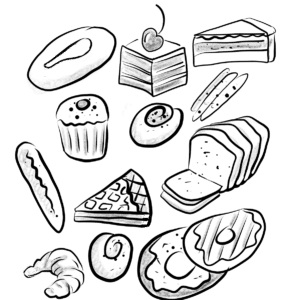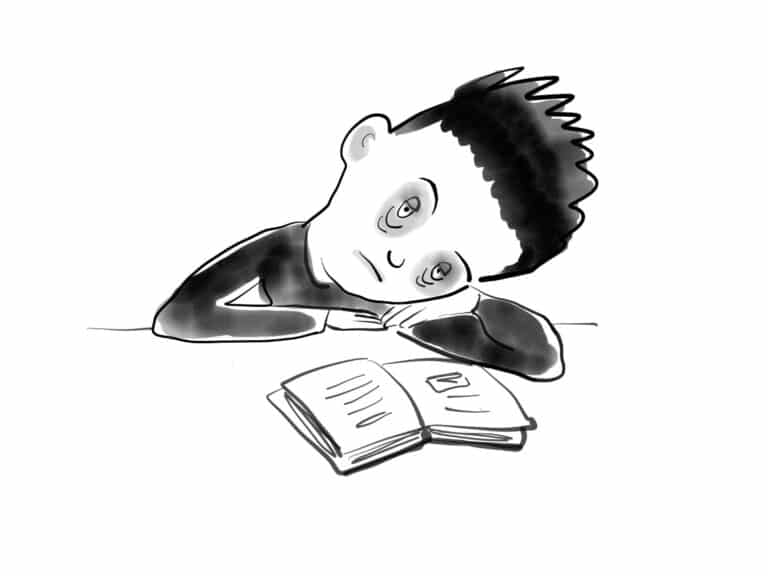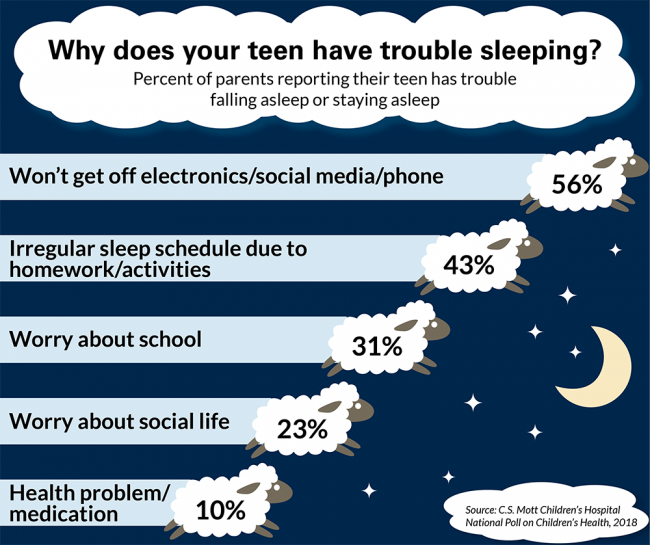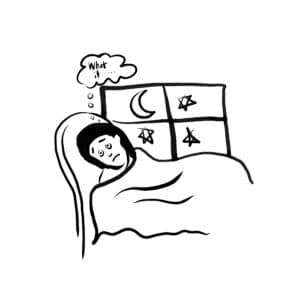
How Going Gluten-Free Transformed our Home
Hi, I’m Melissa, Beth asked me to explain how going gluten-free made a difference in our household. I have a

According to HealthPost, if a child loses 1 hour of sleep a night, it is the equivalent to the loss of 2 years of cognitive maturity the next day. A fifteen-year-old will therefore function at the level of a 13-year-old following a late night.
In my post about perfectionism, I mentioned we wanted our son, Harry, to join the basketball team. All I can say is, be careful what you wish for! Harry now has four training sessions per week and gets up at 5.50 AM on two days to attend the 6.50 practices. It wouldn’t be so bad if he went to bed early, but we hound him to go to bed from 10 PM until he finally crashes at 11 PM. This is way too late, as he needs 8.5—10 hours of sleep to function at his best.
Age Hours of Sleep
0-1 yr 14-18 hrs
1-3 yrs 12-14 hrs
3-5 yrs 11-13 hrs
5-12 yrs 10- 12 hrs
12-18 yrs 8.5-10 hrs
According to the International Dyslexia Association, around 30% of children with dyslexia also have ADD. ADD creates problems with getting to sleep. The following is taken from www.additudemag.com/sleep-aids-parents-children-adhd/. This website is a goldmine of information and offers a free download on sleep solutions for kids with ADHD.
“Research of children and adults with ADHD (when compared to controls) shows that the majority of these individuals has a late sleep onset that is associated with a late onset of the sleep hormone melatonin (van der Heijden et al, 2005; van Veen et al, 2010).
Melatonin is produced by the pineal gland in the brain when it is getting dark in the evening, and we wake up by light in the morning. The onset of the melatonin production helps to fall asleep.
For most adults, the onset of melatonin is around 9.30 pm; in ADHD children compared to controls, this occurs at least 45 minutes later, and in adults with ADHD, even 90 minutes later (van der Heijden ea, 2005; van Veen ea 2010). After melatonin onset, it normally takes 2 hours to fall asleep, but in adults with ADHD, it takes at least 3 hours (Bijlenga et al, 2013).”
Harry has ADD, but he is also a teenager. What has been a teen got to do with sleep? I hear you ask. Paul Kelley, an Honorary Associate in Sleep, Circadian and Memory Neuroscience at the Open University, has written an excellent post on theconversation.com as to why it is difficult for teens to be early risers. He says:
“In 2004, researchers at the University of Munich proved that teenagers actually have a different sense of time. Their study showed that the 24-hour cycle which determines when you wake and sleep gets later during your teens, reaching its latest point by the age of 20.
After 20, the body’s waking and sleeping times gradually get earlier again, until at 55 you naturally wake about the same time as you did when you were 10. The link between the movements of this biological clock and the process of puberty was so strong that the researchers suggested this “peak lateness” at the end of the teenage years could be the biological marker for the end of puberty.”
Queensland Health has a fascinating article about 7 amazing things that happen to your body while you sleep, which is well worth a read.
In Medical News Today, I also found an interesting article that says waves of cerebrospinal fluid wash the brain to remove metabolic ̒trash’ when we sleep.
Having read these two articles, I’m convinced Harry needs more than seven hours. Besides that, his late nights and early mornings are affecting everyone in our household.
I’d like to think if we could make Harry understand the benefits of sleep for himself it would make a difference. I know friends have changed their child’s bedtimes with this approach, but I’m not sure it will work for our dyslexia/ADD boy. Anyway, it is worth a try and this is what we’ll tell him.
Parents in a 2018 study said that their child’s electronic devices were the major cause of sleeplessness.

We have never let Harry charge his phone in his room. Yes, this is a constant battle, and we are apparently “the meanest parents in the world”. Harry has poor self-control, and, from charging it in our room, we know his friends regularly send him messages at 2 or 3 in the morning.
Harry, like many children with dyslexia, dislikes school. His ‘happy place’ is on his mountain bike in the hills. Up till now, he has managed to get by at school doing very little homework, however, this year he is taking important examinations, and the number of assignments has ramped up.
I ensure he has a large snack when he gets home after school and give him an hour of ‘down-time.’ Then I sit with him to plan his study. When necessary, I act as a reader-writer for him to get the work finished well before bedtime.
Like many teens, Harry wants to look ‘cool.’ His mountain biking heroes are frequently sponsored by the energy drinks companies Red Bull and Monster. I recently read an article about the effect caffeine has on the teenage body, and I know if his drinks contain caffeine he will struggle to sleep because it can take up to nine hours for caffeine to leave the body.[ii] Milk is Harry’s go-to drink and a cup of warm milk before bed encourages sleep.
Harry already takes Daily Essential Nutrient to control his ADD[iii] so I don’t want to give him extra magnesium, which can aid sleep. I’m going to look at tart cherry as a sleep aid. According to HealthPost
Montmorency Tart Cherry (Prunus cerasus) is a ‘superfruit’ that contains naturally occurring phytomelatonin for a quality sleep. Tart Cherries also contain potent anthocyanin antioxidants that support the immune system.
Melatonin may also be an option, but I’d need to get that for him on prescription.
Tired kids struggle to learn. If you want to know how I taught my son to read and spell in 30 minutes a day, here are my affilate links to All About learning. I hope you find All About Spelling and All About Reading equally helpful.
If your child also struggles to learn the multiplication tables, check out this blog post on how using stories will help them remember the facts.
This programme is based on the Orton Gillingham approach. Learn more about this here.
Speechify is an app that can help dyslexic children as it reads online text. Here is my affiliate link.
[i] Knebel C (2016). Sleep deprived dyslexic. https://blog.dyslexia.com/sleep-deprived-dyslexic/. Accessed 25 February 2021.
[ii]https://www.ncbi.nlm.nih.gov/books/NBK223808/#:~:text=The%20mean%20half%2Dlife%20of,et%20al.%2C%201989). Accessed 25 February 2021.
[iii] https://www.hardynutritionals.com/studies/category/adhd Accessed 25 February 2021.

Hi, I’m Beth. Seven years ago, when I discovered my son had dyslexia, I had a ‘light-bulb’ moment and understood this explained many of my own difficulties. Ever since, I’ve been on a mission to discover the best ways to wrestle what I like to call the dyslexia octopus.

Hi, I’m Melissa, Beth asked me to explain how going gluten-free made a difference in our household. I have a

I need nighttime anxiety relief. It’s 4 AM, and I’m reviewing what happened to Harry at school yesterday and wondering